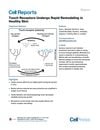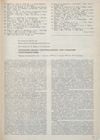 4 citations,
October 2013 in “Springer eBooks”
4 citations,
October 2013 in “Springer eBooks” Melatonin receptors, found in many body parts, can help treat various diseases like depression and diabetes due to their effects on inflammation, tumor progression, sleep disorders, and body mass regulation.
 May 2003 in “Journal of Investigative Dermatology”
May 2003 in “Journal of Investigative Dermatology” The meeting covered advances in understanding hair growth, causes of hair loss, and potential treatments.
January 2010 in “International Journal of Dermatology and Venereology” Dermal papilla cells play a key role in hair loss by responding to androgens.
 31 citations,
November 2016 in “Cell Reports”
31 citations,
November 2016 in “Cell Reports” Touch sensitivity in mouse skin decreases during hair growth due to changes in touch receptors.
 98 citations,
December 2008 in “Journal of Investigative Dermatology”
98 citations,
December 2008 in “Journal of Investigative Dermatology” Prolactin affects hair growth and skin conditions, and could be a target for new skin disease treatments.
 3 citations,
February 2019 in “Journal of Cosmetic Dermatology”
3 citations,
February 2019 in “Journal of Cosmetic Dermatology” The effects of estrogen on human scalp hair growth are unclear and need more research.
 349 citations,
January 2005 in “The FASEB journal”
349 citations,
January 2005 in “The FASEB journal” Human skin can make serotonin and melatonin, which help protect and maintain it.
 January 1993 in “Проблемы Эндокринологии”
January 1993 in “Проблемы Эндокринологии” Spironolactone effectively reduces symptoms of hyperandrogenism but has some side effects.
 22 citations,
May 1999 in “International Journal of Dermatology”
22 citations,
May 1999 in “International Journal of Dermatology” Hair loss from genetics and hormones can be treated with drugs or surgery.
 17 citations,
January 1995 in “The American Journal of Medicine”
17 citations,
January 1995 in “The American Journal of Medicine” The document concludes that proper diagnosis and tailored long-term treatment can effectively manage androgenic disorders in women, improving patient care outcomes.
 24 citations,
March 2001 in “Journal of Endocrinology/Journal of endocrinology”
24 citations,
March 2001 in “Journal of Endocrinology/Journal of endocrinology” Red deer only have androgen receptors in neck hair cells for mane growth during breeding season.
 222 citations,
January 2005 in “Endocrine journal”
222 citations,
January 2005 in “Endocrine journal” Melatonin is important for skin health and protection, and can be made by the skin or applied to it.
 3 citations,
November 2021 in “Journal of The American Academy of Dermatology”
3 citations,
November 2021 in “Journal of The American Academy of Dermatology” Androgenetic alopecia, a genetic disorder affecting up to 50% of adults, is caused by an excessive response to androgens leading to hair follicle shrinkage. Treatments include FDA-approved drugs, other therapies like low-dose oral minoxidil, and hair transplantation.
 15 citations,
August 2022 in “Journal of endocrinological investigation”
15 citations,
August 2022 in “Journal of endocrinological investigation” Vitamin D and calcium are important for quick and effective skin wound healing.
114 citations,
January 2016 in “Current topics in developmental biology/Current Topics in Developmental Biology” Frizzled receptors are essential for various body development processes and maintaining certain body functions.
May 2020 in “Authorea (Authorea)” Olfactory receptors found outside the nose may offer new treatments for diseases like cancer and help in wound healing and hair growth.
 26 citations,
January 2000 in “Hormone research in paediatrics”
26 citations,
January 2000 in “Hormone research in paediatrics” Insulin resistance is linked to high male hormone levels in women, often seen in those with PCOS.
1 citations,
September 2021 in “Advances in skin & wound care” SARS-CoV-2 might infect and multiply in skin tissue, possibly aiding in its transmission.
 March 2022 in “Research Square (Research Square)”
March 2022 in “Research Square (Research Square)” A girl with severe hair loss saw hair regrowth after using cannabis.
 October 2023 in “Scientific reports”
October 2023 in “Scientific reports” Dexamethasone affects hair growth by altering levels of proteins that either promote or inhibit hair follicle growth.
 September 2004 in “Experimental dermatology”
September 2004 in “Experimental dermatology” Melatonin directly affects mouse hair follicles and may influence hair growth.
 109 citations,
October 2007 in “Journal of pineal research”
109 citations,
October 2007 in “Journal of pineal research” Melatonin helps regulate hair growth and protects the hair follicle from stress.
Androgen receptor degrader drugs may be a promising future treatment for hair loss.

Androgenetic alopecia, or hair loss, is caused by a mix of genetics, hormones, and environment, where testosterone affects hair growth and causes hair to become smaller and grow for a shorter time.
 May 2012 in “Scientific American”
May 2012 in “Scientific American” New app improves storm surge predictions; advances in baldness treatment show potential but require time.

The document concludes that hair loss in women can be caused by various factors and is managed with specific treatments like medication, therapy, and lifestyle changes.
11 citations,
May 2012 in “Genesis” Bmpr2 and Acvr2a receptors are crucial for hair retention and color.
 September 2024 in “Ain Shams Medical Journal”
September 2024 in “Ain Shams Medical Journal” Androgenic alopecia causes hair thinning, and treatments include minoxidil, finasteride, and light therapy.
 May 2024 in “Cell proliferation”
May 2024 in “Cell proliferation” Melatonin helps hair grow by activating a specific signaling pathway.
286 citations,
June 2012 in “Nature Immunology” Hair follicles help attract immune cells to the skin during stress.






















